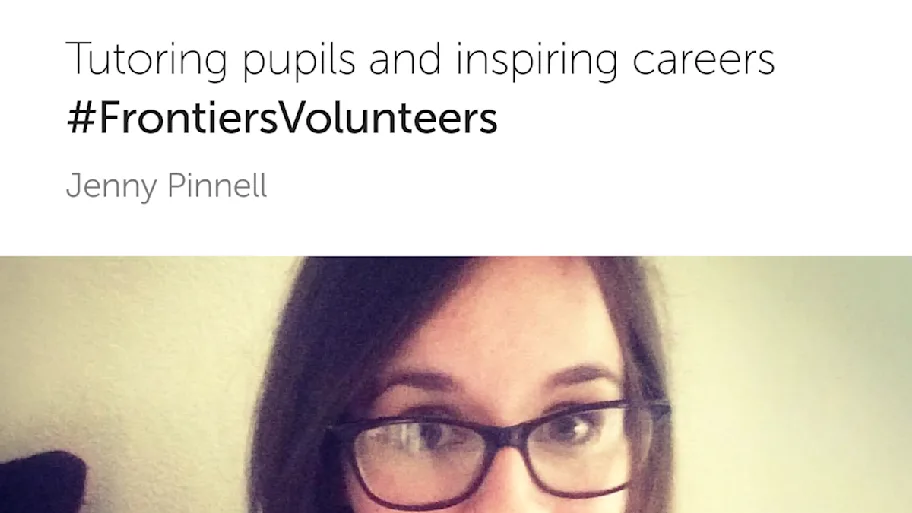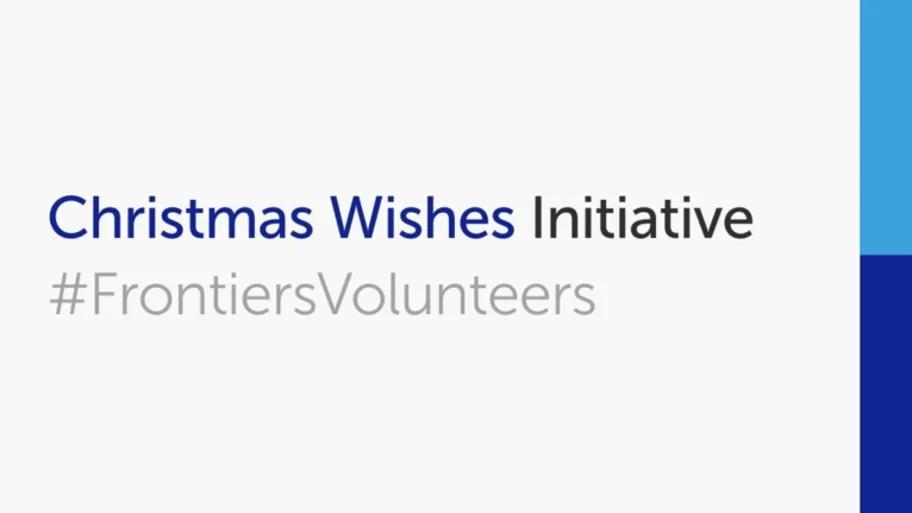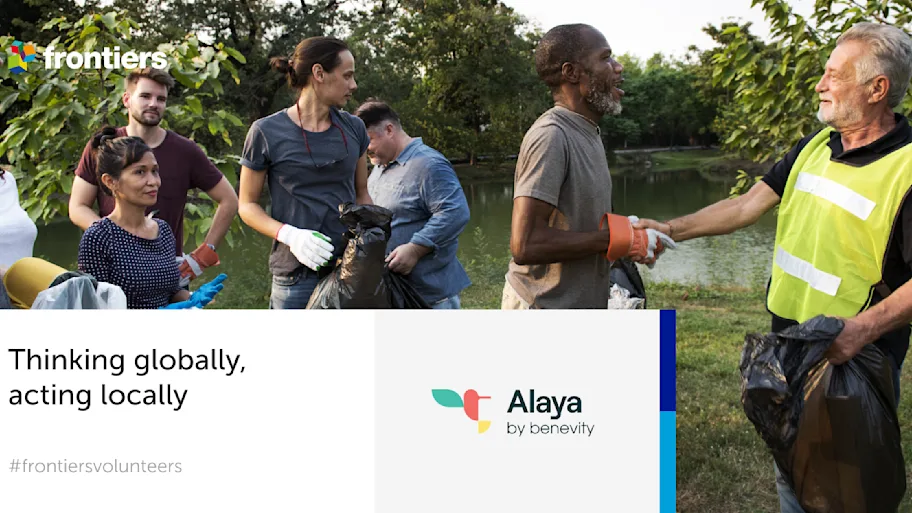
- Science News
- Frontiers news
- Frontiers’ Volunteers: Taking action through tutoring
Frontiers’ Volunteers: Taking action through tutoring
Frontiers’ volunteers have always been at the forefront of community and societal responses. Emily Darley shares her volunteering efforts tutoring, an opportunity that has allowed her to combine her skills and interests.

What is your background and role at Frontiers?
“I joined Frontiers last year as a copyediting specialist. My background is mainly in academia: I did a PhD looking at cognitive processing of linguistic material, followed by a postdoc in which I worked on a computational project in automatic speech recognition. Alongside and in-between this work, I did a couple of freelance stints working on copyediting of scientific articles. I enjoyed it and ultimately decided to take my career in that direction. While I was working in academia, I had quite a few opportunities for teaching — typically undergraduates, but occasional outreach efforts with younger pupils too. It’s something that I miss a little bit in this role. Volunteering is a perfect way to scratch that itch in a way that feels really positive!”
What does the organization you volunteered for do?
“Action Tutoring is a national education charity whose aim is to ‘level the playing field’ to some extent in terms of access to small-group or one-to-one tutoring for children and young people from disadvantaged backgrounds. They coordinate a program in which volunteer tutors are matched with participating schools. The schools then identify eligible pupils who would most benefit from the scheme and facilitate the tutoring sessions. Action Tutoring provides all the materials and coursework relevant to each year group and subject (English or Maths). As a result, the tutors have very little prep work to do and can focus on giving their full attention to the needs of the pupil(s) in each session.”
What did you do during your time volunteering?
“I opted for an online tutoring program (although in future I would love to tutor face-to-face if I can get matched up with a local school) delivering English tutoring to Year 7 pupils. The sessions took place on Tuesday mornings from February to July.
“Before the program started, I attended a helpful training session delivered by Action Tutoring, which provided lots of great tips on pupil engagement, cultivating rapport, behaviour management, and important safeguarding information and guidelines. I also made use of their online resources to familiarise myself with the platform that I’d be using to deliver the sessions and had a look through the learning material. Just before the start of the program, I received some delightful letters from my pupils introducing themselves and expressing how much they were looking forward to it.
“During the program, I typically spent about 15 minutes each week having a quick look through the upcoming material before the session itself, and 45-60 minutes delivering each session. Most weeks, one or two pupils from my allocated group attended the session, so I got to know them fairly well and was able to watch their skills and confidence develop. We would typically spend a few minutes on an icebreaker game or talk about what their week had been like. After that, we would work through a few exercises. This usually involved practising some vocabulary, reading a text together and discussing it, and then completing some tasks related to the text, typically focusing on a specific skill such as inferring or summarising. It was great to have the materials all laid out for me, but the biggest benefit of the small-group format was that we didn’t necessarily have to stick to them rigidly. We could really focus in on the aspects of the text or tasks that interested each pupil, or those that represented a particular challenge for them.
“The highlight of each week for me was usually at the end when I would ask the pupils to rate their confidence on the skill we’d been practising. They nearly always expressed feeling far more confident than they had at the beginning of the session, and I could tell they were happy with their own efforts and had enjoyed the time we’d spent together.”
What was your motivation for choosing this organization?
“I was hoping to find a volunteering opportunity that would allow me to share some of my skills, so Action Tutoring was a perfect fit. It also feels a bit like giving something back, since I benefited greatly during secondary school from several ‘access to university’ schemes targeting pupils without a family history of university attendance or with other forms of disadvantage. It feels good to take my turn at helping to cultivate a sense of potential and achievement in kids who might not otherwise have the same family resources at their disposal as some of their peers. Beyond the actual material that we cover, I feel there’s a real benefit for any child in engaging with an adult who can give them some undivided attention and take a consistent interest in their progress – as well as acting as a bit of a role model in a slightly different way to a teacher.
What did you learn from the experience?
“I learnt a lot as I went along about how to engage with kids of this age in the most productive and engaging ways. Just as they became more comfortable with me during the program, I also became more comfortable with them. It was also quite cool to get some insight into the kinds of things that they found challenging about the English language and the texts that we read together. I’ve occasionally found myself reflecting on some of this while copyediting. Fundamentally, my job is to help scientists express themselves clearly in a language they may not have full command of, and in such a way that the work is readily understandable for potential readers who are also non-native English speakers. Scientists using English as a second language obviously aren’t children, but kids’ learning processes provide an interesting window into some aspects of human language processing that might occasionally be relevant.”
What advice would you give to those looking to get involved in volunteer activities?
“First, I would completely recommend Action Tutoring if anyone is interested in this specific opportunity! Frontons can find them through the Alaya platform. They’re very well organised and a lovely bunch of people with an excellent, evidence-based mission.
“More generally, my advice would be to pick something that is meaningful to you personally, as this really makes volunteering feel worthwhile. I felt a personal connection to this activity, and it helped a lot too that the impact of working with the kids was highly tangible (plus, Action Tutoring has a ton of statistics to back up that anecdotal feeling!). I would also consider looking for something that fits into your life in a way that makes sense. It’s great that at Frontiers we have the flexibility to use our volunteering time on a full-day activity or spread it out over several months, with a short session every week, as I’ve done. It didn’t feel disruptive; in fact, adding an hour of something different to my work week has been pleasant and boosted my energy too!
What a great piece of advice. Thank you for your dedication, Emily!
Frontiers is a signatory of the United Nations Publishers COMPACT. This interview has been published in support of the United Nations Sustainable Development Goals.
About Frontiers
Frontiers is the 3rd most-cited and 6th largest research publisher. We publish groundbreaking discoveries by the world’s top experts. Scientists empower society and our mission is to accelerate scientific discovery by making science open. We place the researcher at the center of everything we do and enable the research community to develop the solutions we need to live healthy lives on a healthy planet. Featuring custom-built technology, artificial intelligence, and rigorous quality standards, our research articles have been viewed more than 2.1 billion times, reflecting the power of research that is open for all.






